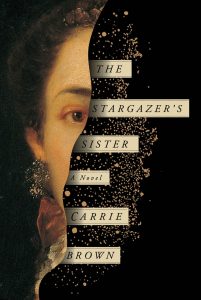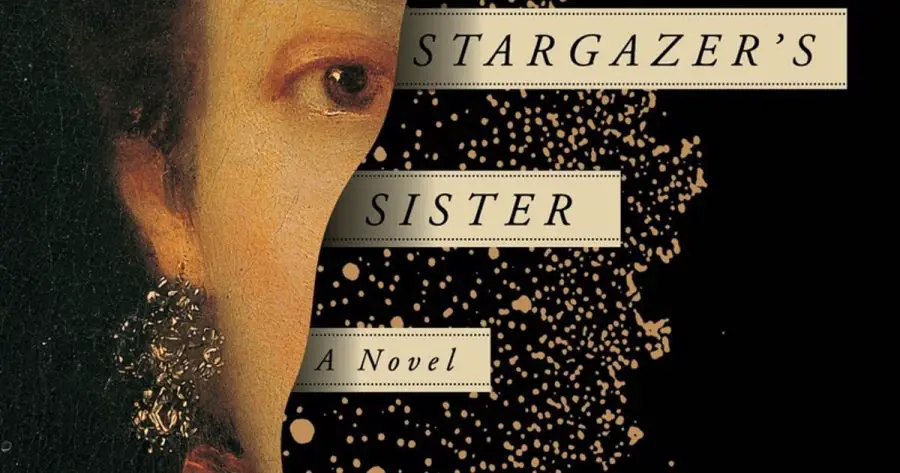 The Stargazer’s Sister
The Stargazer’s Sister
Carrie Brown
Anchor Books
Release Date: January 19, 2016
(trade paperback release: December 13, 2016)
ISBN 978-0-8041-7213-4
The Stargazer’s Sister is a beautifully written historical novel about Caroline Herschel, the German astronomer who lived from 1750 to 1848, sister of acclaimed astronomer William Herschel.
She was the first woman to be paid for her contribution to science, and the first to be awarded a Gold Medal of the Royal Astronomical Society (in 1828). In 1835, she was one of the first two women named as Honorary Members of the Royal Astronomical Society, and in 1838 she was named an honorary member of the Royal Irish Academy. On her 96th birthday, she was given a Gold Medal for Science from the King of Prussia. But this is not what the novel is about – not really.
Instead, The Stargazer’s Sister is a very intimate narrative of Caroline – known to friends and family as “Lina” – as she moves through a most extraordinary life. Unlike other historical dramas, though, Caroline was not caught up in political intrigue, social upheaval or civil strife. Instead, what makes author Carrie Brown’s novel so compelling is how she tells Caroline’s story from the inside out, focusing on the fortitude of a woman whose earthly world seemed so small and yet whose life reached out to the heavens.
What I found most gripping was how Caroline’s contributions to science, both her own and in the support she gave her brother, could have so easily have gone unrealized. As a child, she was tasked with the household work in a large but faltering family. Stunted by a bout of typhus that also left her face horribly scarred, Lina was judged unmarriable by her emotionally distant mother, and instead of being given an education, was trained as a house servant. It was only when Lina’s kind-hearted but ineffectual father would clandestinely include her in her brothers’ lessons that she learned anything beyond the drudgery of constant chores.
If not for William, Caroline’s story would have ended there. Twelve years her senior, William was Lina’s quiet champion. Interested in astronomy at an early age, William had a brilliant mind as well as great musical skill – the son on whom the family had pinned their hopes. He was kind as well as inquisitive, often taking little Lina with him on walks to gaze up at the stars; he would talk to her about scientific principles and philosophies, never telling her that she was stupid or clumsy or ugly. But when Lina was seven, William fled to England to avoid charges of deserting German military service.
It would take fifteen years for William to make a life for himself, but once he had the means he brought Lina to England where she paid him back by running his household and assisting him in his scientific endeavors. As time went on, Lina realized that she, too, was able to comprehend the heavens, and, while still fulfilling her self-imposed obligations, she scanned the skies to see what she might find.
There is so much that is wonderful in The Stargazer’s Sister. Lina’s story is told in such a lyrical style that you immediately get the sense of a character who harbors within herself the capacity to transcend circumstances, even from her dismal beginnings in Hanover. Yet there is no overt foreshadowing of greatness to come; the realization of who Lina is, is gleaned from how her mind works, not in declarations and witticisms. Her progression from frightened child to timid young woman, and then blossoming under the sustenance of being needed and appreciated to maturing into a free thinker in her own right unfolds with just the right touch of pathos and erudition.
Additionally, the sense of time and place in The Stargazer’s Sister is beautifully rendered; the people, conventions, settings, are marvelously presented and come alive without need of meticulously recounted detail – the nuance Ms. Brown uses is so evocative that you don’t even have to stop to envision the environs swirling around Lina, they simply coalesce in the mind’s eye. Lina’s thoughts, the way her mind wanders and draws conclusions, what she expects and accepts as the way things are is not maddening, not confounding, but eye opening. It’s masterfully done.
The narrative does at times bog down, but that is as much a convention of the times being portrayed as it is a problem with the prose – there was so much more time for reflection three hundred years ago than there is now! For all the advancements of our modern life, how often do we stop and look up at the stars? After reading The Stargazer’s Sister, I’ve found myself doing that more often – and marveling at the life of Caroline Herschel. I’m so glad that this novel allowed me to make her acquaintance.
~ Sharon Browning


